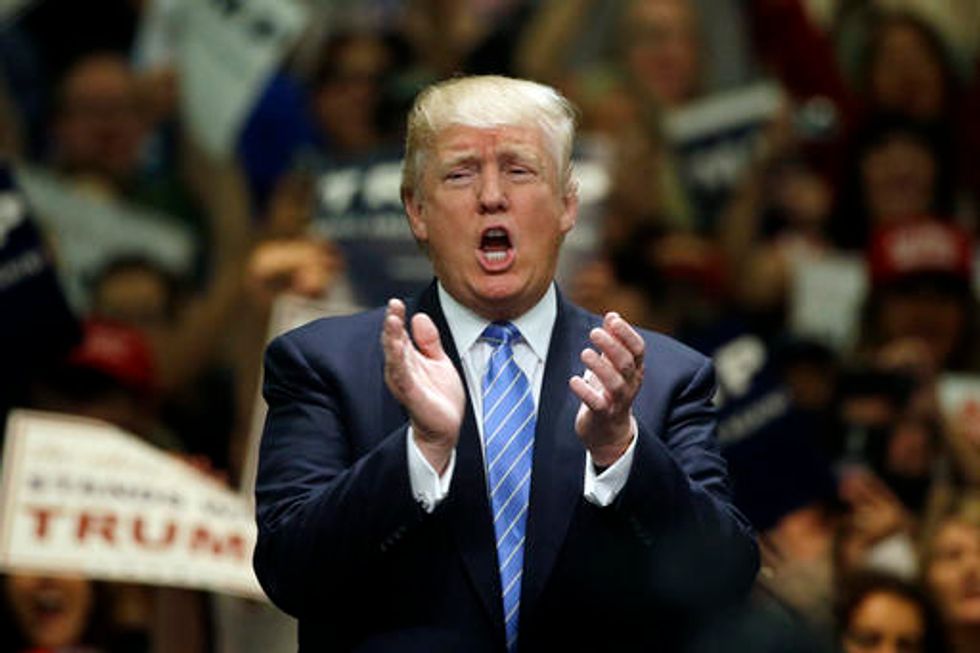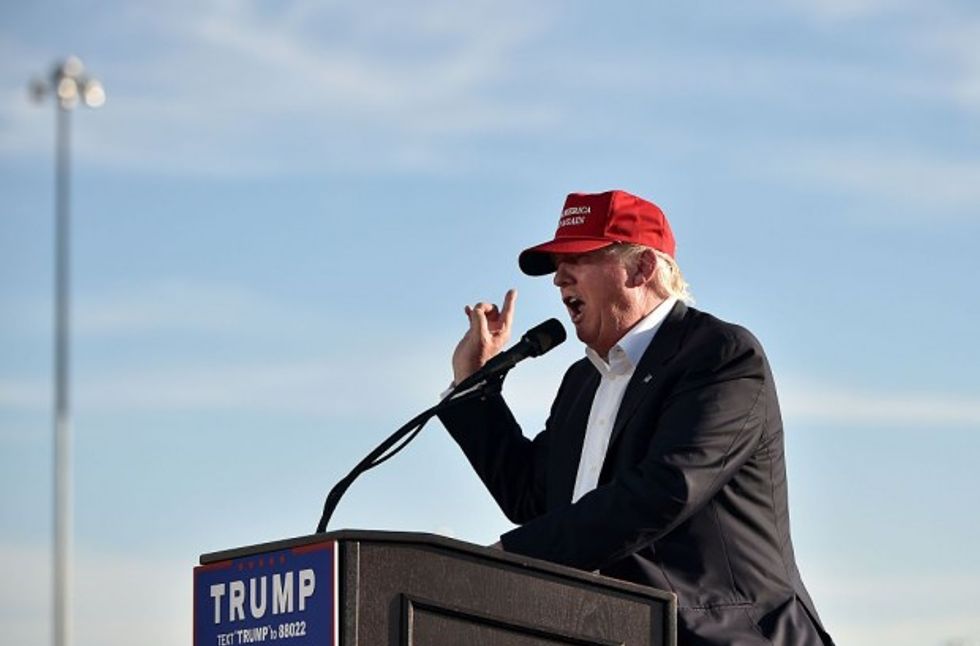
© 2025 Blaze Media LLC. All rights reserved.
Trump's Positions Waft With the Wind, But The Left Provides Him With a Yuge Target For His Outrage
June 06, 2016
Donald Trump has tapped into an anger on the right that has felt silenced by the left and abandoned by their own party.
It’s been difficult for me to get interested in the latest season of House of Cards given that the devious political campaign it depicts doesn’t even come close to the circus we are currently watching unfold: a circus, which of course, centers around the presumptive Republican nominee Donald J. Trump.

It has been interesting to watch many in the Republican establishment fall all over themselves trying to stop Trump while also showing their utter lack of understanding behind Trump’s appeal. And one could certainly say the same thing about the liberal protesters and Bernie Sanders supporters who blocked streets and caused a rally in Chicago to be cancelled. One deranged protester even charged the stage at one of Trump’s events. Do they not realize this madness just pushes more and more people into Trump’s corner?
What’s also interesting is the wide variety of labels being thrown at Trump. Conservative critics claim he’s a leftist for having supported abortion, gay marriage and universal healthcare in the past. Liberal critics call him not just a fascist, but “the next Adolf Hitler” (like say here, here, here and here) for wanting to put a temporary halt to Muslim immigration and build a wall between the United States and Mexico.
Aside from the obvious hyperbole, there doesn’t seem to be much of a connection between them — other than an appeal to rightwing populism. But there have been plenty of rightwing populists that weren’t anywhere near as bad as Hitler. I guess callling Trump “the next Francisco Franco” or “the next George Wallace” wouldn’t generate as many retweets.
While Hitler was deeply ideological, held the same awful core beliefs for a long time, was an expansionist warmonger and, generally speaking, despised capitalism, Trump, as mentioned above, has flip flopped on abortion, gun rights, healthcare and even immigration. Trump has at least denounced some American intervention abroad. And while he is no libertarian by a longshot, he is a businessman himself, so he’s not exactly an opponent of capitalism in general.
To label Trump a fascist is in some ways a slander that falls in line with George Orwell’s definition of fascism, as nothing more than “something not desirable.” However, in another way it is a compliment he doesn’t deserve; namely that his political beliefs are well grounded and consistent enough to merit a label. His campaign is partially fueled by opposition to immigration and free trade, but his appeal extends to his wanton disregard for political correctness and willingness to insult just about every establishment figure who exists.
That doesn’t excuse his inconsistencies of course. Which seem to amount to something like this: The American government is hopelessly corrupt, so let’s execute a man who helped bring that corruption to light. Big government and big business are robbing Americans blind, so let’s have the government expropriate property and give it to billionaires at under-market prices through eminent domain. The United States “should not be the policemen of the world,” but we should be open to putting boots on the ground to create a “safe zone” in Syria. The War in Iraq was a horrible mistake that increased terrorism, so let’s exacerbate that by using torture on suspected terrorists and killing their families. Or maybe not… or whatever.
“That whole heroin thing, I’ll tell you what, we gotta get that whole thing under control,” was Trump’s position on the subject. What does that even mean? When asked in one of the debates about the Trans Pacific Partnership trade deal (which has plenty of problems, to be sure), Trump blasted it saying “…If you look at the way [China] takes advantage, it’s through currency manipulation. It’s not even discussed in the 6,000 page agreement. It’s not even discussed!”
Rand Paul then chimed in: “…We might want to point out that China’s not a part of this deal.”
Trump is a leaf in the wind of outrage. It has to be directed somewhere, but consistency is of little importance. His entire economic outlook seems to boil down to a mixture of light nationalism, a bit of protectionism and whatever the current leaders are doing is stupid — which of course, is mostly correct, but not very constructive.
The subsidized immigration into the United States is a complete mess, although Trump’s government-built wall and the $200 billion dollar annual immigration enforcement price tag is probably not the most practical or ethical way to curtail it. Neither is bringing back Operation Wetback. But as noted above, this is a relatively new opinion for Trump to hold. David Frum pointed out the following:
“Until this very year, Trump’s few sparse comments on immigration fell neatly within the elite consensus. In a December 2012 Newsmax interview, Trump blamed Mitt Romney’s recent presidential defeat on Romney’s ‘self-deportation’ comments. Trump endorsed the then conventional that the GOP’s immigration message had been “mean-spirited” in 2012 and invite more people to become ‘wonderful, productive citizens of this country.’“What seems to have changed Trump’s mind is a book: 'Adios America' by Ann Coulter. The phrase ‘political book of the year’ is usually an empty compliment, but if the phrase ever described any book, 'Adios America' is it. In its pages, Trump found the message that would convulse the Republican primary and upend the dynastic hopes of former-frontrunner Jeb Bush. Perhaps no single writer has had such immediate impact on a presidential election since Harriet Beecher Stowe.”
God help us if Trump gets elected and finds a copy of "Das Kapital" on his nightstand.
Even Trump’s claim to be an outsider is questionable. As Ron Paul pointed out, Trump’s anti-establishment credentials don’t ring true when he’s already staffing his would-be administration with various establishment figures such as Chris Christie, Jeff Sessions and Richard Haas, the current president of the Council on Foreign Relations.
What underlies the politics of outrage is that the United States has become far more partisan. Indeed, it’s the same thing fueling Bernie Sanders' campaign. Part of this is because the internet and social media has allowed people to create their own echo chambers of news in which the only time people hear an opposing opinion is when that opinion is being critiqued. As CGP Grey noted, people in opposing groups “…don’t really argue with each other, they mostly argue with themselves about how angry the other group makes them.”
Another major factor has been that over the past forty years, Republicans and Democrats have been moving away from each other to communities of like-minded people. According to Bill Bishop in The Big Sort, “…[in] 1976…Just over 26 percent of the nation’s voters lived in landslide counties [counties where one party won by 20 percentage points or more]… By 2000, the number had risen to 45.3 percent.”
In these sorts of communities, the only direction for political opinion to go is more radicalized.
Thus you see Sanders gaining support among Democrats — although Hillary Clinton being, to borrow Trump’s phrase, crooked probably helps as well — and Trump among Republicans. And they combine to fuel each other’s outrage. And, oh, boy, is the Republican base is outraged? It’s not just from the economic instability brought on by a bloated government and foreign policy, it’s also from feeling completely sold out by their own party that tried to shove the Gang of Eight amnesty bill down their throats against the will of the Republican base.
Then couple that with the lunacy on the far left, which seems to go on without repercussions, as illustrated by Depaul University allowing protesters to disrupt and effectively cancel Milo Yiannopoulos’ speech there. Donald Trump actually punches back to these elements on the left. Indeed, the seeds of Trump’s success lie in the supposed poop Swastika that cost the president his job at the University of Missouri. It lies in the dried ink of the resignation letters of Brendan Eich, Tim Hunt and Larry Summers. It can be found in the blatant lies that nevertheless brought about media circuses at Duke and Virginia. It lies in the one-sided coverage of the Trayvon Martin and Michael Brown shootings and the riots in Ferguson and Baltimore. It lies in the chants of “What do we want… Dead cops… When do we want it?... Now!” It lies in the ever-growing list of microagressions that all but criminalize conservative thought. In this fertile soil, Trump’s campaign was allowed to grow.
Trump is neither a conservative nor a libertarian. Really, there’s little about a foul-mouthed, philandering narcissist who despises his own supposed party that should appeal to evangelicals and the Republican base, but many love him all the same. They love him because he has taken a sledge hammer to political correctness while promising “to make America great again,” which can inspire those who feel sold out and ignored regardless of whether it’s coherent. And of course the left has simply doubled down, which just rallies even more people to his side.
And in the end, this outrage will likely propel Trump to the piece of real estate he values most: 1600 Pennsylvania Ave.
–
TheBlaze contributor channel supports an open discourse on a range of views. The opinions expressed in this channel are solely those of each individual author.
Want to leave a tip?
We answer to you. Help keep our content free of advertisers and big tech censorship by leaving a tip today.
Want to join the conversation?
Already a subscriber?
more stories
Sign up for the Blaze newsletter
By signing up, you agree to our Privacy Policy and Terms of Use, and agree to receive content that may sometimes include advertisements. You may opt out at any time.
© 2025 Blaze Media LLC. All rights reserved.
Get the stories that matter most delivered directly to your inbox.
By signing up, you agree to our Privacy Policy and Terms of Use, and agree to receive content that may sometimes include advertisements. You may opt out at any time.


